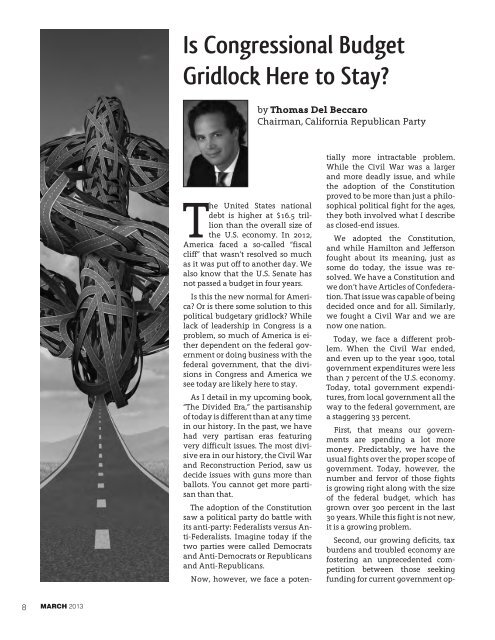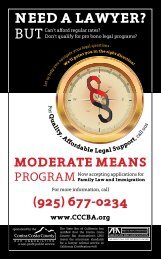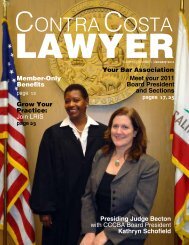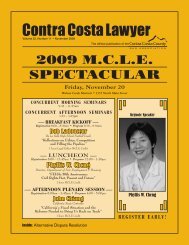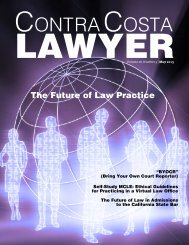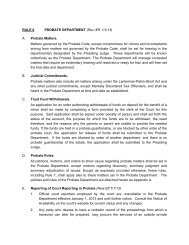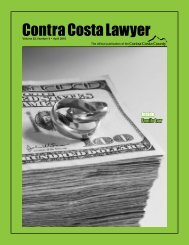download - Contra Costa County Bar Association
download - Contra Costa County Bar Association
download - Contra Costa County Bar Association
Create successful ePaper yourself
Turn your PDF publications into a flip-book with our unique Google optimized e-Paper software.
The United States national debt<br />
is higher at $16.5 trillion than the<br />
overall size of the U.S. economy.<br />
In 2012, America faced a so-called<br />
“fiscal cliff” that wasn’t resolved so<br />
much as it was put off to another<br />
day. We also know that the U.S. Senate<br />
has not passed a budget in four<br />
years.<br />
Is this the new normal for America?<br />
Or is there some solution to this political<br />
budgetary gridlock? In plain<br />
truth, while lack of leadership in<br />
congress is a problem, so much of<br />
America is either dependent on the<br />
federal government or doing business<br />
with the federal government,<br />
that the divisions in congress and<br />
America we see today are likely<br />
here to stay.<br />
As I detail in my upcoming book,<br />
The Divided Era, the partisanship<br />
Is Congressional Budget<br />
Gridlock Here to Stay?<br />
by Thomas Del Beccaro<br />
Chairman, California Republican Party<br />
The United States national<br />
debt is higher at $16.5 trillion<br />
than the overall size of<br />
the U.S. economy. In 2012,<br />
America faced a so-called “fiscal<br />
cliff” that wasn’t resolved so much<br />
as it was put off to another day. We<br />
also know that the U.S. Senate has<br />
not passed a budget in four years.<br />
Is this the new normal for America?<br />
Or is there some solution to this<br />
political budgetary gridlock? While<br />
lack of leadership in Congress is a<br />
problem, so much of America is either<br />
dependent on the federal government<br />
or doing business with the<br />
federal government, that the divisions<br />
in Congress and America we<br />
see today are likely here to stay.<br />
As I detail in my upcoming book,<br />
“The Divided Era,” the partisanship<br />
of today is different than at any time<br />
in our history. In the past, we have<br />
had very partisan eras featuring<br />
very difficult issues. The most divisive<br />
era in our history, the Civil War<br />
and Reconstruction Period, saw us<br />
decide issues with guns more than<br />
ballots. You cannot get more partisan<br />
than that.<br />
The adoption of the Constitution<br />
saw a political party do battle with<br />
its anti-party: Federalists versus Anti-Federalists.<br />
Imagine today if the<br />
two parties were called Democrats<br />
and Anti-Democrats or Republicans<br />
and Anti-Republicans.<br />
Now, however, we face a potentially<br />
more intractable problem.<br />
While the Civil War was a larger<br />
and more deadly issue, and while<br />
the adoption of the Constitution<br />
proved to be more than just a philosophical<br />
political fight for the ages,<br />
they both involved what I describe<br />
as closed-end issues.<br />
We adopted the Constitution,<br />
and while Hamilton and Jefferson<br />
fought about its meaning, just as<br />
some do today, the issue was resolved.<br />
We have a Constitution and<br />
we don’t have Articles of Confederation.<br />
That issue was capable of being<br />
decided once and for all. Similarly,<br />
we fought a Civil War and we are<br />
now one nation.<br />
Today, we face a different problem.<br />
When the Civil War ended,<br />
and even up to the year 1900, total<br />
government expenditures were less<br />
than 7 percent of the U.S. economy.<br />
Today, total government expenditures,<br />
from local government all the<br />
way to the federal government, are<br />
a staggering 33 percent.<br />
First, that means our governments<br />
are spending a lot more<br />
money. Predictably, we have the<br />
usual fights over the proper scope of<br />
government. Today, however, the<br />
number and fervor of those fights<br />
is growing right along with the size<br />
of the federal budget, which has<br />
grown over 300 percent in the last<br />
30 years. While this fight is not new,<br />
it is a growing problem.<br />
Second, our growing deficits, tax<br />
burdens and troubled economy are<br />
fostering an unprecedented competition<br />
between those seeking<br />
funding for current government op-<br />
8<br />
MARCH 2013


